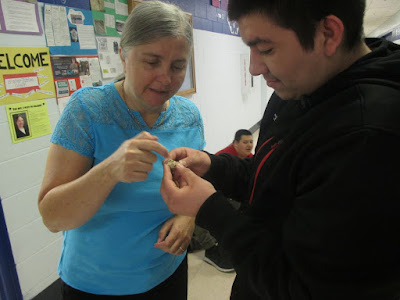On Wednesday, Dr. Natalie Gordon, PhD and Dr. Richard Gordon, PhD, two scientists who spend the winter doing marine biology at the Gulf Specimen Marine Laboratory in Florida, visited the Learning 4Life Success program at Tiospa Zina Tribal School. Their visit was the final activity of a two week science exploratory. The juniors and seniors in the Technology for Life Success and Communication for Life Success classes prepared for the Science Conference by studying mollusks, echinoderms, sea turtles, the geological history of South Dakota, and marine fossils.
 |
| Dr. Natalie Gordon, PhD teaches us about turtles. |
Dr. Natalie Gordon presented on her work rescuing sea turtles. Most of the seven extant (living) sea turtle species are endangered. They are at risk of becoming extinct. She explained how dangerous our human pollution can be for sea turtles. For example, sea turtles love to eat jelly fish. When humans throw away plastic bags, they end up in the ocean. Sea turtles mistake them for jellyfish and eat them. Unless the sea turtle is rescued and receives emergency care, it can die.
Sea turtles are also at risk from helium balloons (also look like jellyfish), fishing trawl nets, fish hooks, plastic debris in the water, and even human diseases. There is a lot humans can do to help sea turtles and other animals and plants that might become extinct. Some people say that homo sapiens (humans) need to take responsibility for stopping pollution to prevent extinction of animals and plants because without the animals and plants, homo sapiens will become extinct too!
 |
| Dr. Richard Gordon, PhD and Treyton Neilan (Future Paleontologist) discuss sedimentary rock layers. |
Dr. Richard Gordon presented a bit about his current research. He is researching the very beginnings of life. He explained how organisms with only one cell but no nucleus came first and then something made them get a nucleus. We do not know what made that happen but that is what he is trying to figure out. Also he explained that some scientists have a theory that the very first life on planet earth, like a bacteria, might have come from someplace else because at first, earth was molten magma. We don’t know for sure how all this works, but Richard does. We enjoyed learning from him. It really stretched our thinking.
 |
| 4.5 billion years ago this was bivalves on the ocean floor. |
Natalie and Richard also brought some rocks from Florida. They are sedimentary rocks with marine fossils in them. We used a hammer to break open the rocks and chisel out the fossils. Then we studied them with magnifying glasses and used the internet and books to try to figure out what type of animal made that fossil. The fossils were at least 4.5 million years old. We had fossils of several kinds of gastropods, cephalopods, corals, and bivalves such as clams and scallops. It was amazing to think about the animals being alive 4.5 million years ago! And now here we were holding their fossils in our hands right here in Tiospa Zina Tribal School. We each got to take some of these fossils home to keep them. That is awesome, too!
 |
| Dr. Natalie Gordon examines a spiral marine gastropod fossil Jaron Wilson discovered |
We really enjoyed hosting the scientists and having this Science Conference like we will do in our future college or our work life. We were also really glad to have Lori and two students from Lori’s class come to the Science Conference. Everyone had to take notes, like you do at a real conference. We had to treat each other like colleagues. We also had to greet the scientists properly.
Our class prepared a slideshow which we used to explain about Tiospa Zina and about our Life Success program. We also introduced ourselves with a slide that told a little bit about us. Public speaking like that was a little stressful, but we are very satisfied with how our presenting went.
The science conference was a lot of hard work but we really got a lot of learning out of it. If you come to our classroom, you will see our display. We can also show you some fossils. We all wrote thank you letters today, and sent a booklet to Natalie and Richard with a summary of our learning.
We hope Sister Patrice invites Natalie and Richard back next spring!